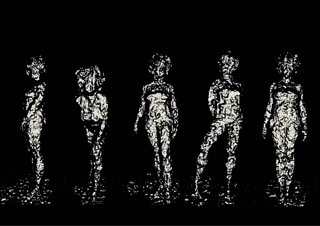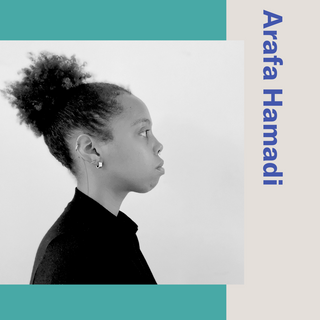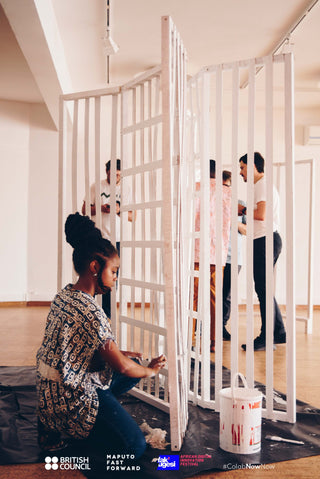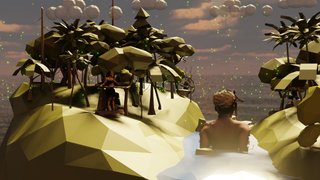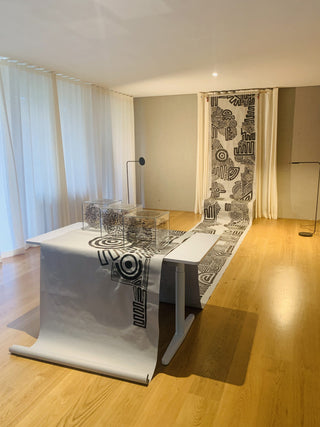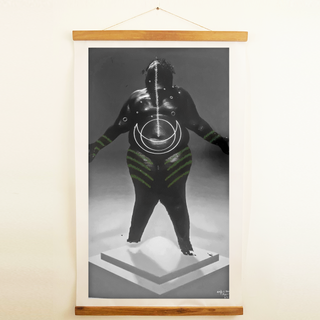When we speak of safety, we must ask ourselves: what type of safety are we referring to? And for whom, and from whom, do we seek to ensure this safety? How can and should we extend this concept into other parts of our work for exploring safety and creating inclusive spaces? Additionally, how do we select partners in our projects digital tools to physical installation?
Arafa Hamadi (they/them) has spun a whirlwind of diverse and imaginative endeavors spanning architecture, exhibition, and virtual spaces. They have obviously dedicated their creative journey to addressing this deeply personal question. We’ll walk through their path from Tanzania to Scotland and back again.
Building Bridges of Safety and Inclusion
Throughout this talk, the challenges arise when working within the festival landscape and contemplating the integration of physical and virtual realms. We’ll discuss the intricacies of selecting partners and tools. More importantly, we'll reflect on Hamadi’s creative vision and lean into the tension between precision and comfort.
Hamadi's work, like Letu (2021), pulls deeply from gaming to showcase how to usher a participant from one internal dialogue to another. Their ongoing multimedia project titled "Kiburi" (2021-present) takes center stage. Hamadi delves into the intricate design and thematic elements of pre-colonial East African indigenous tattoo practices within this extraordinary body of work. They skillfully blend contemporary Swahili coast-inspired symbols with aesthetic drawing techniques. Specifically, Hamadi draws on the rich cultural traditions of the Makonde and the Barabaig tribes.
Above all, as we navigate the journey of creating safe spaces, we face significant questions. How can we construct spaces that foster inclusivity for marginalized communities? How do we approach this process with thoughtfulness and intentionality, ensuring we do not unintentionally harm those we seek to represent and welcome? Lastly, join us to keep exploring safety and creating inclusive spaces in this dynamic talk.
About Your Speaker
Arafa Cynthia Hamadi (they/them) is a multidisciplinary artist working in Tanzania and Kenya. Hamadi works in the physical world, designing festival sets and installation pieces. They also create within the digital realm, building digital worlds while delving into the immersive VR space and moving images. Arafa’s work also explores their queerness in relation to space and occupancy, focusing on joy and tangible ways of connecting the East African queer community. They do this not just through their art, but also through organising small-scale events, curation, research and active participation in the growing Ballroom scene in their region.
They have been featured in exhibitions in Mozambique, Tanzania, the USA and online. Hamadi was also part of the cohort of 2020 fellows for the ICA Fellowship (SA) and the Bakanal de Afrique Festival (USA). In 2021, they completed a Digital Arts Residency at Nafasi Art-Space (TZ), the New Dimensions Lab by Electric South (SA), and participated in the Pro-Helvetica Residency in Switzerland in Summer 2022. They have also curated various residencies and exhibitions in Tanzania, most notably the 2022 UMOJA Residency in Tanzania.
Currently, they are developing their 3D/VR work titled “LETU 2.0” with the support of Electric South (SA), as well as developing a physical event in Dar-es-Salaam with Aichieli Temu. The space, ALTÆR, aims to be a model for events prioritising community, focusing on the safety of its marginalised attendees. Arafa is also part of the 2023 Building Beyond Mentorship programme by the Prince Claus Fund & Creative Industries Fund NL.
When we speak of safety, we must ask ourselves: what type of safety are we referring to? And for whom, and from whom, do we seek to ensure this safety? How can and should we extend this concept into other parts of our work for exploring safety and creating inclusive spaces? Additionally, how do we select partners in our projects digital tools to physical installation?
Arafa Hamadi (they/them) has spun a whirlwind of diverse and imaginative endeavors spanning architecture, exhibition, and virtual spaces. They have obviously dedicated their creative journey to addressing this deeply personal question. We’ll walk through their path from Tanzania to Scotland and back again.
Building Bridges of Safety and Inclusion
Throughout this talk, the challenges arise when working within the festival landscape and contemplating the integration of physical and virtual realms. We’ll discuss the intricacies of selecting partners and tools. More importantly, we'll reflect on Hamadi’s creative vision and lean into the tension between precision and comfort.
Hamadi's work, like Letu (2021), pulls deeply from gaming to showcase how to usher a participant from one internal dialogue to another. Their ongoing multimedia project titled "Kiburi" (2021-present) takes center stage. Hamadi delves into the intricate design and thematic elements of pre-colonial East African indigenous tattoo practices within this extraordinary body of work. They skillfully blend contemporary Swahili coast-inspired symbols with aesthetic drawing techniques. Specifically, Hamadi draws on the rich cultural traditions of the Makonde and the Barabaig tribes.
Above all, as we navigate the journey of creating safe spaces, we face significant questions. How can we construct spaces that foster inclusivity for marginalized communities? How do we approach this process with thoughtfulness and intentionality, ensuring we do not unintentionally harm those we seek to represent and welcome? Lastly, join us to keep exploring safety and creating inclusive spaces in this dynamic talk.
About Your Speaker
Arafa Cynthia Hamadi (they/them) is a multidisciplinary artist working in Tanzania and Kenya. Hamadi works in the physical world, designing festival sets and installation pieces. They also create within the digital realm, building digital worlds while delving into the immersive VR space and moving images. Arafa’s work also explores their queerness in relation to space and occupancy, focusing on joy and tangible ways of connecting the East African queer community. They do this not just through their art, but also through organising small-scale events, curation, research and active participation in the growing Ballroom scene in their region.
They have been featured in exhibitions in Mozambique, Tanzania, the USA and online. Hamadi was also part of the cohort of 2020 fellows for the ICA Fellowship (SA) and the Bakanal de Afrique Festival (USA). In 2021, they completed a Digital Arts Residency at Nafasi Art-Space (TZ), the New Dimensions Lab by Electric South (SA), and participated in the Pro-Helvetica Residency in Switzerland in Summer 2022. They have also curated various residencies and exhibitions in Tanzania, most notably the 2022 UMOJA Residency in Tanzania.
Currently, they are developing their 3D/VR work titled “LETU 2.0” with the support of Electric South (SA), as well as developing a physical event in Dar-es-Salaam with Aichieli Temu. The space, ALTÆR, aims to be a model for events prioritising community, focusing on the safety of its marginalised attendees. Arafa is also part of the 2023 Building Beyond Mentorship programme by the Prince Claus Fund & Creative Industries Fund NL.
Our Approach
Game-Making Practice
It's for everyone! We believe that game design and thinking is not limited to "the video game industry." It's a creative point of view that any discipline can use.
LEARN FROM Doing
Our workshops are focused on activities with a majority of time spent on making things.
this is only the start
You'll grow from here. We hope that this is a stepping stone for you to permanently work with the material of games.


